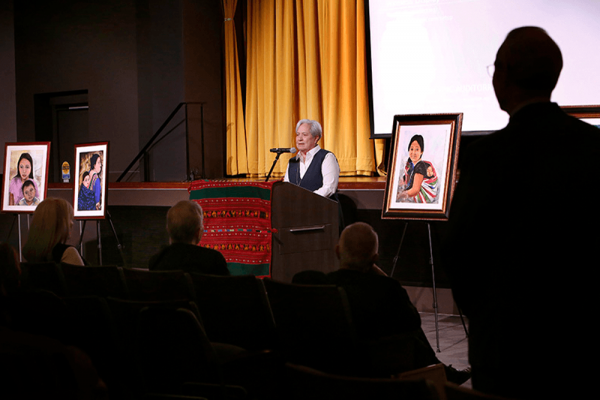“I think we all need therapy,” one of my friends recently wrote. And it’s true, of course.
Numerous reports, including Dana Milbank’s “President Trump actually is making us crazy,” have pointed out that since the 2016 election there has been an increase in mental health challenges including depression, stress, grief, anxiety, and sadness. According to Megan Cerullo’s recent article for the New York Daily News, doctors have added a new name to their lexicon: President Trump Stress Disorder. Symptoms include insomnia, hypervigilance, and an inability to detach from the 24-hour news cycle.
Since for some, actual therapy is beyond reach, a more intentional approach to surviving this era is required. While most days I am flailing about just as unmoored as anyone else, I have, occasionally, kept the despair at bay by using these strategies:
1) Unplug from nonstop media. I used to be a regular consumer of news. I even went on a sailing trip once where, despite being surrounded by sparkling water, I focused on my screen the first hour of each day, reluctant to disconnect from the constant newsfeed. A year into this presidential term, however, I realized I needed to make a change.
The childish and outrageous tweets that drive the news cycle are encouraged and amplified when people pay attention. Did our mothers not teach us to ignore the bully when we were children? So, quit giving Trump the air he so desperately wants and too often gets. Tune him out. And tune out media outlets who overwhelmingly cover his bad behavior when instead they could be attentive to all of the significant problems that are being exacerbated by an inept administration.
2) Learn something new. This year, I dusted off my guitar that has taken up closet space for 20 years without seeing the light of day. I also started listening to more podcasts (consider Revisionist History by Malcolm Gladwell), watching documentaries (one favorite is Rachel Carson on American Experience), and reading more books, such as Meghan O’Gieblyn’s Interior State: Essays, which assists in shifting one’s focus from the East Coast to the Midwest.
3) Change the conversation. Politics used to dominate our discussions when my husband and I went out with our friends. We were all keenly attuned to the pulse of our country and we regularly enjoyed sharing what we had recently read or heard about a variety of leaders and movements. Now we’ve started also exploring different topics: What are your fears about aging? What is your first memory? What is a belief you used to have but no longer accept? Brené Brown says the result of being vulnerable with trustworthy people is greater intimacy. In this day of increasing loneliness, taking friendships to another level is the best medicine money can buy.
4) Respond in new ways. Even if we fail by judging others when the log in our own eye distorts our vision, we can learn to respond in better, more successful ways. In a recent conversation with Oprah Winfrey, Eckhart Tolle explained that while our country is undergoing a regressive cycle, we should see this reality not as a cause for lamentation, but rather as an opportunity for growth. We know — from personal experience, if nothing else — that we grow only through pain and loss. This is our collective challenge, one that calls each of us to be better and to do more.
This is our moment to pinch a few pennies and give them to organizations providing assistance to immigrants and asylum seekers. Or, this is our time to volunteer at a local food pantry or register people to vote. What if, like all other periods of history, this is the time in which we prove who we are? This is when, if not as a country, then as individuals, we do the hard work of clearing a path through the wilderness for those who are the most at risk during this time of national idolatry.
5) Cultivate a sense of wonder. Do you get exhausted and bewildered by our collective attention to the distinction between what is fact and what is fake? We used to take for granted a certain set of givens: A fact is based upon proven hypotheses. And yet, here we are, in a world where almost limitless knowledge is at our fingertips but we seem unable to agree on that which is true and that which is false.
One result of our need to be astute consumers of data is that we can easily close ourselves off to mystery and wonder and the emotive responses they can cultivate within us. Nature and music, art and literature can be especially helpful here. Recently, while my husband and I were traveling in Paris, we had the good fortune of getting last-minute tickets to a concert in the Sainte-Chapelle cathedral. While we stood in line with our fingers crossed that two available tickets would be ours by the time we reached the front, a woman from Germany leaned in to tell us she’d been to numerous concerts here. Anyone with a hint of openness to divine presence, she said, would find the combination of lilting music amidst illuminated floor-to-ceiling stained glass windows unforgettable. From the first violin strum of the Bach sonata, I understood what she meant. It was a mesmerizing experience, one where union — with Mystery, or the world — seemed possible, even if fleetingly so.
This list is not exhaustive. I’m sure there are many other ways in which we can cultivate better mental, emotional, spiritual, and even physical health during this crisis. The first step is always the hardest and in this case, it might simply be the step of intention.
Got something to say about what you're reading? We value your feedback!







